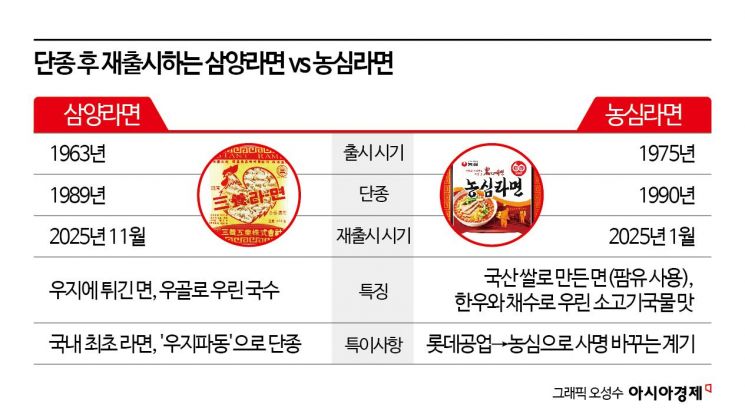Interesting Korean Rivalry : Ramen (한국라면)Wars - 'The Original' Samyang vs. 'The King' Nongshim"
라면 전쟁: '원조' 삼양 vs '왕' 농심 🍜
Ramen Wars: 'The Original' Samyang vs. 'The King' Nongshim
입력: 2025.10.23. 오전 9:33
안녕하세요, K-Culture와 K-Food를 사랑하는 여러분! K-Pop 아이돌의 컴백 전쟁만큼이나 뜨거운 것이 바로 한국의 **'라면 전쟁'**입니다. 🍜 (Hello, lovers of K-Culture and K-Food! Just as hot as K-Pop idol comeback battles is Korea's **'Ramen War.'** 🍜) 오늘은 한국 라면 업계의 **농심**과 '원조' **삼양**이 '옛날 라면' 주제로 자존심을 걸고 맞붙은 소식을 전해드립니다. (Today, we bring news of the 'absolute powerhouse' **Nongshim**, and the **'original' Samyang** going head-to-head over the theme of 'old-school ramen,' putting their pride on the line.)
🔗대전의 최고 국수 맛집 5 (My Top 5 Noodle Spots in Daejeon)주요 어휘 3가지
3 Key Vocabulary Words
1. 원조 (Wonjo)
의미: 어떤 사물이나 기술, 사상 등의 맨 처음 시작. (The Original / Originator) 로마자 발음: Won-jo 예시: 삼양은 한국 최초의 라면 원조 회사입니다. (Samyang is the original company that made the first ramen in Korea.)
2. 맞붙다 (Matbutda)
의미: 서로 마주 겨루거나 싸우다. (To clash / To go head-to-head / To confront) 로마자 발음: Mat-but-da 예시: 두 라이벌 회사가 신제품으로 맞붙었습니다. (The two rival companies clashed with new products.)
3. 재도약 (Jaedoyak)
의미: 다시(再) 뛰어오름(跳躍). 실패나 부진을 딛고 다시 발전함. (A re-leap / A comeback / Resurgence) 로마자 발음: Jae-do-yak 예시: 삼양은 이번 신제품으로 내수 시장 재도약을 노리고 있습니다. (Samyang is aiming for a resurgence in the domestic market with this new product.)
삼양의 도전: '원조의 자존심'과 '우지'의 부활
Samyang's Challenge: The 'Original's Pride' and the Revival of 'Beef Tallow'
'불닭볶음면'으로 세계를 불태운 삼양식품이 '삼양라면 1963'을 출시합니다. (Samyang Foods, which set the world on fire with 'Buldak' (Fire Noodles), is launching 'Samyang Ramyeon 1963'.) 놀라운 점은, 삼양이 이 제품을 위해 창사 이래 처음으로 신제품 출시 행사를 연다는 것입니다. (Samyang is holding its first-ever new product launch event in company history for this product.)
가장 큰 특징은 면을 튀길 때 **우지(Uji, 소기름, beef tallow)**를 사용했다는 점입니다. (The biggest feature is that they used **Uji (beef tallow)** to fry the noodles.) 1989년, 삼양은 '공업용 우지' 혐의(나중에 무해하다고 밝혀짐)로 큰 타격을 입고 1위 자리를 농심에 내주었습니다. (In 1989, Samyang was hit hard by accusations of using 'industrial tallow' (later proven harmless) and lost its #1 spot to Nongshim.)
따라서 '우지'를 다시 사용하는 것은, 과거의 불명예를 씻고 '원조의 자존심'을 되찾겠다는 상징적인 행보로 풀이됩니다. (Therefore, using 'Uji' again is interpreted as a symbolic move to wash away past dishonor and reclaim the 'pride of the original.')
🔗우영우 시즌 2 깊이 탐구 (이 스캔들, K-드라마 스토리 같지 않나요?)'불닭'은 세계로, '1963'은 한국으로
'Buldak' for the World, '1963' for Korea
외국인들에게 흥미로운 사실! '불닭볶음면'은 세계적으로 히트작이지만, 한국 국내 매출은 전체의 23% 수준에 그쳤습니다. (An interesting fact for foreigners! 'Buldak' is a massive global hit, but domestic Korean sales merely ended at the 23% level.) 한 관계자는 "솔직히 불닭은 국내 소비자들 사이에선 인기가 많은 제품은 아니다"라고 말했습니다. (One insider said, "Honestly, Buldak isn't *that* popular among domestic consumers.")
삼양은 '불닭'으로 글로벌 시장을, '삼양라면 1963'으로 국내 시장 재도약을 노리는 '투트랙' 전략을 사용하는 것 같습니다. (It seems Samyang is using a 'Two-Track' strategy: aiming for the global market with 'Buldak' and a comeback in the domestic market with 'Samyang Ramyeon 1963'.)
농심의 방어: '왕'의 여유
Nongshim's Defense: The 'King's' Composure
'절대 강자' 농심은 이미 한발 앞서 있었습니다. (However, the 'absolute powerhouse' Nongshim was already one step ahead.) 농심은 지난 1월, 창립 60주년을 맞아 '농심라면'을 출시했습니다. (Nongshim launched 'Nongshim Ramyeon' last January for its 60th anniversary.) 이 라면은 출시 3개월 만에 1000만 봉 판매를 돌파하며 이미 시장에 안정적으로 안착했습니다. (This ramen already settled stably in the market, surpassing 10 million units sold in just 3 months.)
삼양이 '삼양라면 1963'으로 도전장을 던지자, 라면 라이벌의 경쟁은 다시 불붙게 되었습니다. (As Samyang threw down the gauntlet with 'Samyang Ramyeon 1963,' the rivalry between the ramen rivals has reignited.)
주요 문법 3가지
3 Key Grammar Points
1. N-(으)로 풀이되다 (N-(eu)ro pul-i-doeda)
의미: 어떤 현상이나 행동이 ~라고 해석되다. (To be interpreted as / To be seen as) 로마자 발음: -(eu)ro pul-i-doe-da 예시: 이것은 시장 점유율을 높이려는 전략으로 풀이됩니다. (This is interpreted as a strategy to increase market share.)
2. N-에 도전장을 던지다 (N-e dojeonjang-eul deonjida)
의미: ~에게 도전을 신청하다. (To throw down the gauntlet / To issue a challenge to) 로마자 발음: -e do-jeon-jang-eul deon-ji-da 예시: 삼양이 농심에 도전장을 던졌습니다. (Samyang has issued a challenge to Nongshim.)
3. N-에 그치다 (N-e geuchida)
의미: 어떤 수준이나 범위에서 끝나고 더 나아가지 못하다. (To merely end at / To be only / To stop at) 로마자 발음: -e geu-chi-da 예시: 국내 매출은 23%에 그쳤습니다. (Domestic sales merely ended at 23%.)
레트로를 넘어선 '브랜드 리빌딩'
Beyond Retro: 'Brand Rebuilding'
업계는 이 대결을 단순한 복고(Retro)가 아닌 '브랜드 리빌딩' 경쟁으로 봅니다. (The industry sees this confrontation not as simple retro, but as a 'Brand Rebuilding' competition.) 옛날 이름만으로는 한계가 있고, 현재 세대의 입맛을 사로잡을 수 있는 '완성도'가 승부를 가를 것입니다. (There's a limit to just using an old name; the 'level of perfection' that can capture the taste of the current generation will determine the winner.)
여러분은 이 라면 전쟁의 승자가 누구일 것 같나요? (Who do you think will be the winner of this Ramen War?)
복습 객관식 문제 (Review Multiple-Choice Quiz)
-
기사에서 삼양을 '원조'라고 부르는 이유는 무엇인가요? (Why is Samyang called the 'Wonjo' in the article?)
정답: **② 한국 최초의 라면을 만들어서**
해설 (Explanation): '원조(Wonjo)'는 'The Original'을 의미합니다. 삼양은 1963년 한국 최초의 라면을 출시했습니다. ('Wonjo' means 'The Original.' Samyang launched Korea's first-ever ramen in 1963.)
-
다음 문장을 "It is interpreted as a symbolic move"로 번역할 때 가장 알맞은 표현은 무엇인가요? (Which expression is most appropriate to translate "It is interpreted as a symbolic move"?)
"이것은 상징적인 행보(_______)." (This is a symbolic move(_______).)
정답: **③ (으)로 풀이된다**
해설 (Explanation): 'N-(으)로 풀이된다'는 'is interpreted as N'이라는 의미로, 현상을 분석할 때 사용합니다. ('N-(eu)ro pul-i-doeda' means 'is interpreted as N' and is used when analyzing a phenomenon.)
